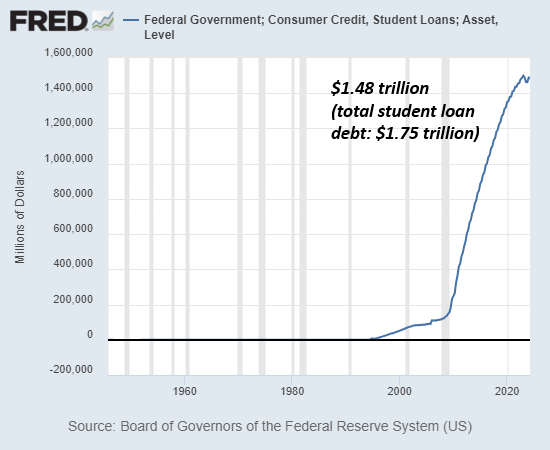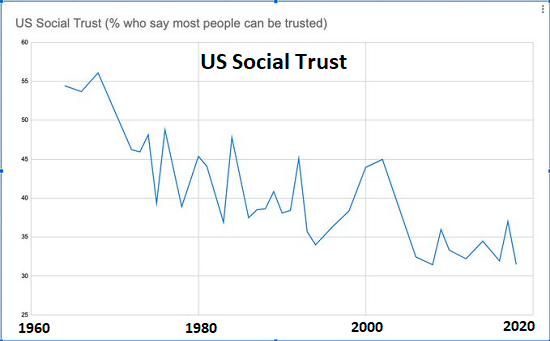Authored by Charles Hugh-Smith via oftwominds,
This has now reached the point that corporations and institutions are in effect “mining what remains of our trust” to boost profits / private gains.
Social cohesion is another ill-defined concept which is core to social and economic stability, despite the difficulty of measuring it. As with social trust, we sense its presence and its decay rather than measure ups and downs with any precision. Social trust is a core component of social cohesion, and we sense the decay of both, even if there is no easy metric to chart.
When did our trust in our core institutions start unraveling? Perhaps the more insightful question is: when did our institutions lose our trust? For trust is not just given, it is for institutions–government, healthcare, higher education, industry, media, etc.–to gain or lose by their actions and the disconnect between their claims and the reality.
In the broad sweep of recent history, the trust earned by institutions in the 1940s and 1050s began unraveling in the 1960s and accelerated in the 1970s. For many Americans, the inconsistencies of the official version of the assassination of President John F. Kennedy in 1963 were deeply troubling. Similar inconsistencies arose in the 1968 assassinations of Martin Luther King, Jr. and Robert Kennedy.
If the public wasn’t being given the full story, why not? Was it really “national security,” or were institutional malfeasance and cover-ups what was actually going on?
The war in Vietnam was another source of institutions losing trust. Between the claims of victory just ahead, the 5 o’clock follies and body counts, the “splendid little war” transmogrified into a big, dirty war that could no longer be contained within the neat narratives established in the “good war” of World War II.
The majority of Americans still wanted to believe in the rightness of their government and the causes of American policy, but many others had suffered complete disillusionment and loss of trust in the official accounts.
Watergate fueled the disillusionment as cover-ups increasingly appeared to be the primary modus operandi of all institutions. This disillusionment increased as the Church Committee revealed the politicization of the nation’s law enforcement agency, the FBI, and the illegal domestic activities of the FBI and the nation’s premiere intelligence / covert action agency, the CIA, both of which sought to suppress critics of the war in Vietnam with illegal means.
While the conservative movement openly derided government competence in the 1980s, the big, bad government continued expanding regardless of whether “conservatives” or “liberals” were nominally in charge. The federal government’s footprint was reduced in President Clinton’s campaign to “reinvent government,” and the federal budget briefly enjoyed surpluses in the Internet boom years, but since then the expansion of government and institutional /corporate power has continued unabated.
The decay of public-private industries such as healthcare and higher education gathered speed in the 1980s, as costs and profits soared. Consider this chart of student loans. It is astonishing that somehow, despite a rapidly expanding population of college students, higher education managed to remain affordable and did not need students to borrow $2 trillion prior to the early 2000s.

Healthcare also rocketed far beyond affordability, and as with higher education, what expanded wasn’t the number of doctors or professors; it was the cadre of highly paid administrators that expanded.
The public slowly caught on that insiders were busy covering up their self-service. The institution had become a profit center rather than an entity performing a vital public service. The pandemic experience accelerated this awareness.

This has now reached the point that corporations and institutions are in effect mining what remains of our trust to boost profits / private gains. Correspondent M.S. offered an example of this: “We bought a GE microwave because of the company’s reputation, and it failed within two months. The appliance technician said that he noticed many similar failures with GE.”
We observe this mining the last of our trust for private gain everywhere. We are frogs in a simmering pot of water that is approaching the boiling point, and as we await the complete unraveling of the social order, we sigh You can’t stop Progress. Indeed.
Sixty years of institutions and business interests mining our trust has eroded social cohesion to the point that non-linear instability now looms as the banquet of consequences. Forfeiting our trust for private profits and power has a price that has yet to be paid.
New podcast: How Asset Deflation Could Play Out (35:37 min)
191 views